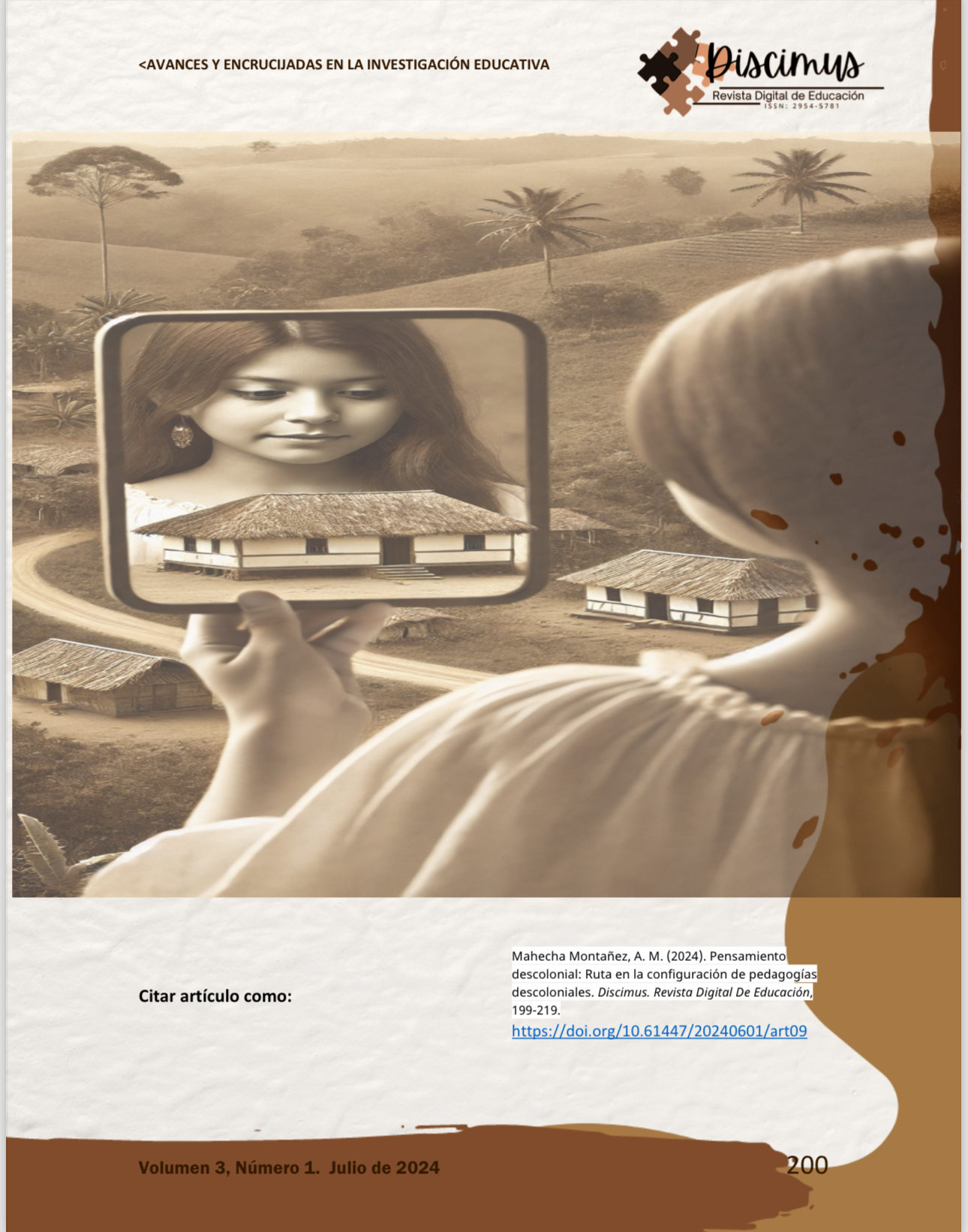Descolonial Thought: Route in the Configuration of Descolonial Pedagogies
DOI:
https://doi.org/10.61447/20240601/art09Keywords:
Decolonization, Educational research, Alternative education, Latin America, Educational sciences, ColonyAbstract
Descolonialism as a theory has been taking shape since the time of the conquest and has had repercussions to this day within the configuration of a descolonial pedagogy. Therefore, this article seeks to identify how the path of anticolonial struggles was traced so that an epistemic field emerges that interrogates various disciplines of the social sciences which had been configured under Western disciplinary paradigms, interrogating the educational task, favoring nowadays we talk about colonial pedagogies. The methodology used is mediated by the PRISMA protocol, which helped to systematize and reach a subsequent reflection of the information found, from which it was determined that there are authors who contested the hegemonic ways of existing and being in the world other than colonial ones, which crossed pedagogy; these initial approaches were descolonial cracks within the colonial regime, a path for the descolonial bets of indigenous intellectuals, the future of anticolonial discussions and the Modernity/Coloniality group in the reflection on a descolonial pedagogy from which non-hegemonic knowledge is valued. and its need in the modern context.
Downloads
References
Burman, E. (2019). Fanon y Educación El “niño como método”. Morata
Castro-Gómez, S. (2005). La hybris del punto cero: Ciencia, raza e ilustración en la Nueva Granada (1750-1816). (1° ed). Pontificia Universidad Javeriana. http://hdl.handle.net/10554/41212
Dussel, E. (1994). 1492 - El encubrimiento del otro: (Hacia el origen del mito de la modernidad). Plural Editores. https://biblioteca.clacso.edu.ar/clacso/otros/20111218114130/1942.pdf
Escobar, A. (2003). Mundos y conocimientos de otro modo» El programa de investigación de modernidad/colonialidad latinoamericano. Tabula Rasa, 1, 51-86. https://doi.org/https://doi.org/10.25058/20112742.188
Fanon, F. (1965). Los condenados de la Tierra. Fondo de Cultura Económica México.
Freire, P. (2005). La pedagogía del oprimido (55° Edición). Siglo XXI Editores.
Lander, E. (Comp.). (2000). La colonialidad del saber: eurocentrismo y ciencias sociales. Perspectivas latinoamericanas. CLACSO. http://bibliotecavirtual.clacso.org.ar/clacso/sur-sur/20100708034410/lander.pdf
Mignolo, W. (2010). Desobediencia epistémica: retórica de la modernidad, lógica de la colonialidad, gramática de la decolonialidad. Buenos Aires: Del Signo.
Mora, L. (2020). Bartolomé de Las Casas y el pensamiento decolonial: debates y precisiones. Revista Estudios, (41), 1-17. https://doi.org/10.15517/re.v0i41.44849
Pagea, M., McKenziea, J., Bossuytb, P., Boutronc, I., Hoffmannd, T., Mulrowe, C., Shamseerf, L., Tetzlaffg, J., Aklh, E., Brennana, S., Choui, R., Glanvillej, J., Grimshawk, J., Hróbjartssonl, A., Lalum, M., Lin, T., Lodero, E., Wilsonp, E., McDonalda, S., McGuinnessq, L., Stewartr, L., Thomass, J., Triccot, A., Welchu, V., Whitingq, P., Moherv, D. (2021). Declaración PRISMA 2020: una guía actualizada para la publicación de revisiones sistemáticas. Research Methods & Reporting, 372(71), 1-9. https://doi.org/10.1136/bmj.n71
Poman de Ayala, F. (1615). Nueva crónica y buen gobierno. Biblioteca Ayacucho.
Puiggrós, A. (1990). Sujetos, disciplina y currículum en los orígenes del sistema educativo argentino. Buenos Aires: Galerna.
Puiggrós, A. (2005). De Simón Rodríguez a Paulo Freire. Convenio Andrés Bello. https://biblioteca-repositorio.clacso.edu.ar/bitstream/CLACSO/15365/1/puiggros_de_simon_rodriguez_a_paulo_freire.pdf
Quijano, A. (2000). Colonialidad del poder, eurocentrismo y América Latina. CLACSO. http://bibliotecavirtual.clacso.org.ar/clacso/sur-sur/20100708050100/11_quijano.pdf
Quijano, A. (2014). Colonialidad del poder y clasificación social. En A. Quijano, Cuestiones y horizontes: de la dependencia histórico-estructural a la colonialidad/descolonialidad del poder: antología esencial (pp. 285-327). http://biblioteca.clacso.edu.ar/clacso/se/20140507042402/eje3-8.pdf
Reinaga, F. (1956). Franz Tamayo y la revolución boliviana. La Paz: Casegural.
Reinaga, F. (2010). La Revolución India. Movimiento Indianista Katarista.
Restrepo, E. y Rojas, A. (2010). Inflexión decolonial: fuentes, conceptos y cuestionamientos. Universidad de Cauca, Instituto pensar. https://www.researchgate.net/publication/271506120_Inflexion_decolonial_fuentes_conceptos_y_cuestionamientos
Rivera Cusicanqui, S. (2013). Los artesanos libertarios y la ética del trabajo. Taller de Historia Oral Andina. http://www.relats.org/documentos/HIST.America.LehmnRivera1988.pdf
Rivera Cusicanqui, S. (2015). Historia oral, investigación-acción y sociología de la imagen. Educar para vivir bien, vivir bien para educar. XXII Simposium de Educación, ITESO. Guadalajara, Jalisco, México.
Rivera Cusicanqui, S. (2018). Un mundo ch'ixi es posible. Ensayos desde un presente en crisis. Tinta Limón.
Rodríguez, S. (2018). Sociedades Americanas en 1828 (1.ª ed.). Universidad Autónoma Metropolitana. https://casadelibrosabiertos.uam.mx/gpd-sociedades-americanas-en-1828.html
Santos, J., Piovezana, L. y Bernardi, L. (2018). Colonialidad y descolonización en la educación latinoamericana: el caso de las licenciaturas interculturales indígenas con el Pueblo Kaingang. EccoS Revista Científica, (45), 59-78. https://doi.org/10.5585/eccos.n45.8281
Weinberg, G. (1984). Modelos educativos en la historia de América Latina. CLACSO. https://biblioteca.clacso.edu.ar/clacso/se/20201111054036/Modelos-educativos.pdf
Zea, L. (1943). El positivismo en México: Nacimiento, apogeo y decadencia. Fondo de Cultura Económica.
Zea, L. (1945). En torno a una filosofía americana. El Colegio de México. https://biblioteca.clacso.edu.ar/Mexico/ces-colmex/20200914040753/jornadas-52.pdf
Zea, L. (1972). América como conciencia. Paginadura Ediciones.
Zea, L. (1976). El pensamiento latinoamericano. Ariel.
Zea, L. (1986). América Latina en sus ideas. UNESCO.
Zea, L. (2000). Fin de Milenio: emergencia de los marginados. Fondo de Cultura Económica.

Downloads
Published
Issue
Section
License
Copyright (c) 2024 Andrea Marcela Mahecha Montañez (Autor/a)

This work is licensed under a Creative Commons Attribution-NonCommercial-ShareAlike 4.0 International License.
Open Access Policy at Discimus Journal
Discimus Journal is committed to the promotion of free circulation of scientific and academic knowledge, simultaneously ensuring appropriate acknowledgment for our authors while adhering to the ethical principles of scientific publishing. In alignment with this goal, Discimus publishes all its articles under the ATTRIBUTION-NONCOMMERCIAL-SHAREALIKE 4.0 INTERNATIONAL CC BY-NC-SA 4.0
What does this imply for authors, readers, and the scientific community?
1. Usage Freedom: Under the license CC BY-NC-SA 4.0, anyone is allowed to share (copy and redistribute the material in any medium or format) and adapt (remix, transform, and build upon the material) the articles published in Discimus, for any purpose, including commercially.
2. Attribution: Users must give appropriate credit, provide a link to the license, and indicate if changes were made to the original work. This credit must include the author's citation, the article title, the publication in Discimus, and, if feasible, the DOI of the article. This attribution should not in any way suggest that the authors or Discimus endorse the use made of the work.
3. Share Alik: If users remix, transform, or build upon the material, they must distribute their contributions under the identical license as the original.









